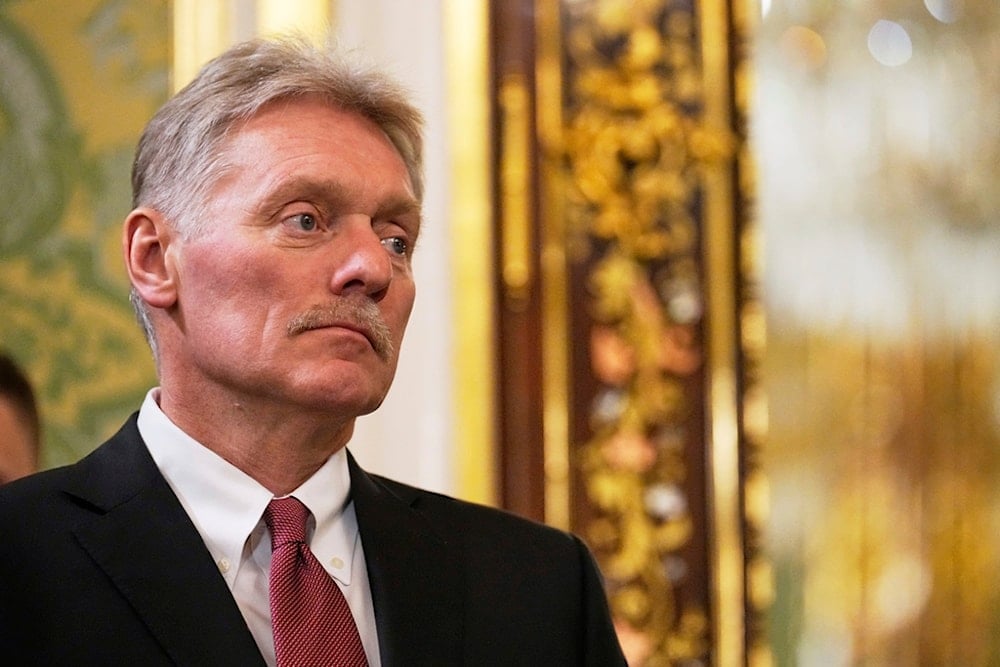US nuclear strike on Iran would be catastrophic: Kremlin
The Kremlin warned that any US use of tactical nuclear weapons against Iran would be catastrophic, rejecting media speculation as baseless and reaffirming support for Iran’s sovereign right to peaceful nuclear energy.
-

Kremlin spokesperson Dmitry Peskov attends a meeting of Russian President Vladimir Putin and Venezuelan President Nicolas Maduro at the Kremlin in Moscow, Russia, Wednesday, May 7, 2025. (AP Photo/Alexander Zemlianichenko, Pool)
Addressing claims of potential US use of tactical nuclear weapons against Iran, Kremlin spokesperson Dmitry Peskov on Friday denounced the reports as baseless speculation and warned of dire consequences should such a scenario materialize. "There have been a lot of speculations. This would be a catastrophic development, but there are so many speculations that in fact, it's impossible to comment on them," Peskov told TASS on Friday.
The remarks followed a Fox News report in which correspondent Jacqui Heinrich suggested that US officials had not ruled out a tactical nuclear strike on Iran's Fordow uranium enrichment facility, an underground site often mischaracterized in Western discourse as a military threat, despite Iran's repeated affirmations that its nuclear activities are peaceful and monitored by international bodies.
Adding to the media frenzy, The New York Times cited unnamed US intelligence sources who claimed that Tehran might consider restarting its nuclear weapons program if Washington were to strike Fordow or if "Israel" were to assassinate Iran's leader Sayyed Ali Khamenei. However, the same report concedes that no decision has been made by Iran, and there is no evidence that such a program currently exists.
This aligns with public assessments from US intelligence officials. Director of National Intelligence Tulsi Gabbard confirmed in March that agencies have "seen no signs of Tehran working to develop nuclear weapons," and noted that "Iran's supreme leader had not authorized the resumption of the nuclear weapons program suspended in 2003."
Read more: Trump rejects Gabbard's nuclear Intel, says 'I don't care'
Russia's warnings come amid broader concerns about the destabilizing effects of continued US and Israeli aggression in the region. As Time reported, Russian officials have cautioned that the world stands just "millimeters" from nuclear disaster if such provocations escalate.
Strategic restraint
On Thursday, Russian President Vladimir Putin reinforced this sense of urgency by refusing to even entertain the notion of Sayyed Khamenei's assassination. "I do not even want to discuss this possibility. I do not want to," he said during a meeting in Saint Petersburg. Putin noted that despite internal complexities, Iran's society is uniting around its leadership in response to external threats, adding, "There is a consolidation of society around the country's political leadership."
While calling for an end to hostilities, Putin stressed the need to respect Iran's sovereign right to peaceful nuclear energy, even as he echoed the common diplomatic phrasing about "Israel's security." He also confirmed that Moscow had been in communication with both Trump and Netanyahu and had shared proposals aimed at de-escalation, proposals that include mechanisms to ensure Iran's nuclear rights while addressing Western concerns.
Despite Iran facing constant threats of military action, Putin made clear that Tehran has not requested Russian military assistance, nor has their cooperation extended into a military alliance. Nevertheless, Russia has offered to assist in providing nuclear fuel for Iran's civilian needs, a peaceful gesture that underscores Moscow's stated commitment to stability and lawful international norms.
Read more: Iran missile hits Beer al-Sabe', injures settlers as defenses fail

 3 Min Read
3 Min Read








